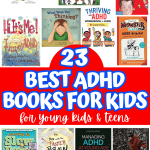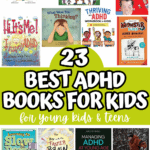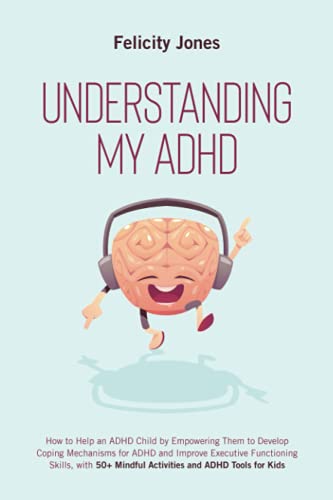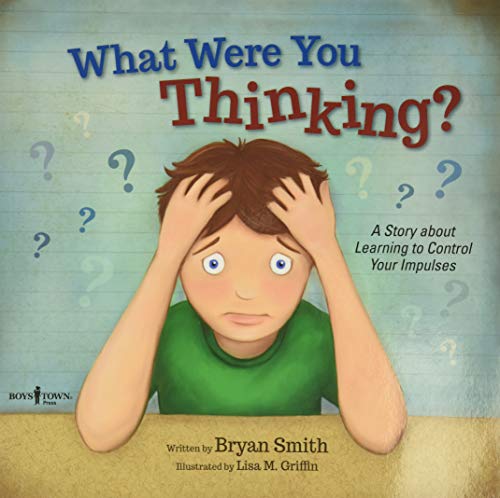23 Best ADHD Books for Kids (That They’ll Relate To)
When my son was first diagnosed with ADHD, we found that ADHD books for kids were a powerful tool to help him understand his attention deficit hyperactivity disorder.
These books, ranging from picture books to interactive workbooks, not only explain the symptoms of ADHD but also offer practical strategies for managing inattention, impulsivity, and hyperactivity.
Whether you’re looking for books to foster empathy or provide coping techniques, this book list will offer valuable resources to support your child through their ADHD journey.
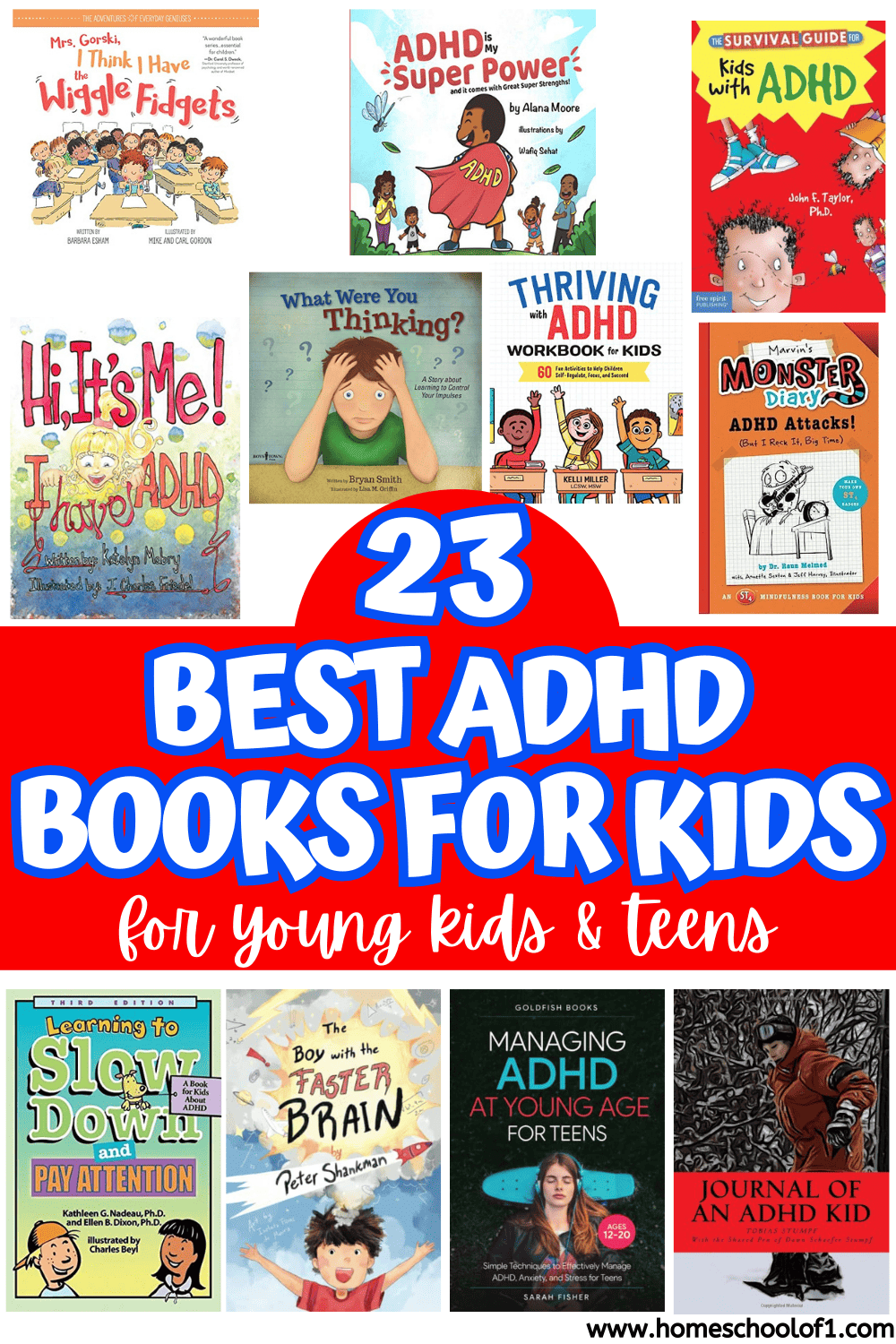
**This post may contain affiliate links. As an Amazon Associate and a participant in other affiliate programs, I earn a commission on qualifying purchases.**
Top Books About ADHD For Kids
Here are some of the best books for kids with ADHD that explain the condition in a way children can relate to and learn from.
This was one of the first ADHD books I read with my son, and it hit home immediately. The dragon’s big energy, constant distractions, and trouble focusing felt so familiar. But what I loved most was how it gently introduced coping strategies without making ADHD feel like a “problem.” It gave us language to talk about what was going on in his brain—and he loved the dragon illustrations too.
Related: Best ADHD toys
This book perfectly captures what it feels like to have ADHD—at least, that’s what my son told me after we read it together. He said, “That’s exactly what it’s like inside my head!” It’s joyful, fast-paced, and energetic, but it also shows how love and understanding make a huge difference. A favorite for both of us.
We used this book to help explain ADHD to my son’s younger cousin, and it really opened up a great conversation. Told from the perspective of a friend, it encourages kids to be more empathetic and curious rather than judgmental. It’s great for classroom or sibling settings when you want to build understanding in a kind, age-appropriate way.
While not ADHD-specific, this one helped my son start identifying and naming his emotions—a huge step in managing his impulsivity. We used it as a jumping-off point to talk about how emotions can show up fast and loud when you have ADHD, and what to do with them. Bonus: the illustrations are really calming.
This one made us both laugh because “wiggle fidgets” is something we’ve actually said in our house. It’s written in a school setting, which was great when we were working on classroom strategies. The teacher-student dynamic gave my son a sense of how adults can help—not just scold—and that was a big deal for his confidence.
This book takes the “faster brain” idea and runs with it in such a positive, empowering way. My son really responded to the message that his brain isn’t broken—it just works differently. I loved how it emphasized curiosity and strengths rather than focusing only on challenges. It’s one of the few that he re-read without me even asking.
Related: Best homeschool math for ADHD
We used this almost like a workbook—reading a few pages at a time and talking through the examples. It’s not flashy, but it works. The tips are practical and easy to try out, and the language is clear enough that my son could understand without getting overwhelmed. Great for kids who want more than just a story.
This metaphor really stuck with my son—he kept saying, “Yep, that’s me, zooming all the time!” The comparison of an ADHD brain to a race car helped him see his speed as something exciting, not wrong. We talked about how every race car needs pit stops, and that became our code for taking breaks when things felt overwhelming.
Related: best ADHD homeschool curriculum
“Cory Stories” felt like reading someone’s diary—in the best way. My son related to Cory almost instantly, and the short vignettes helped him understand that ADHD wasn’t just about school problems—it was about friendships, emotions, and daily ups and downs too. This one helped normalize a lot of what he was feeling.
This was one of the first books where my son said, “Wait… this kid is me.” It’s a warm, direct story with lots of heart, and it doesn’t sugarcoat the challenges—but it also doesn’t dwell on them. I appreciated how it celebrated small victories and emphasized self-acceptance. We ended up gifting a copy to his teacher.
Related: All about me printable
I'll admit—when I first saw the word “mindfulness,” I wasn’t sure my hyper kid would go for it. But surprisingly, he really connected with some of the breathing and grounding exercises. We started using a few of the quick activities before homework or when he was having a rough day. It wasn’t a cure-all, but it gave him tools, which mattered.
This was a game-changer. My son laughed so hard reading this and finally saw another kid dealing with the same things—getting distracted, blurting stuff out, trying to stay still. It was the first book he finished on his own without me pushing. That sense of being understood? You can’t fake that. This one felt real.
We treated this workbook like a weekly check-in. My son enjoyed the activities way more than I expected—especially the ones on planning and breaking tasks into steps. It helped me, too, to see where he was struggling and where he was actually doing better than I thought. Definitely worth it if you want something more hands-on.
Marvin became kind of a household name for a while. The way he narrates his ADHD experiences—complete with humor and monster logic—made it really fun to read aloud. My son loved that it wasn’t preachy but still had takeaways he could use. It struck a great balance between silly and seriously helpful.
This one was recommended by a therapist we worked with, and it ended up being surprisingly fun. The activities helped my son think through real-life stuff—like how to plan his morning or organize his desk—without feeling like a boring chore. We did a few pages together each week, and I saw a noticeable improvement in how he approached problem-solving.
Related: Puzzle books for kids
This book felt like a gentle guide that respected kids’ intelligence. It gave my son (and honestly, me) a clearer understanding of what ADHD actually is—not just a list of symptoms. We liked that it included activities, but also left space for real conversations. It’s a great one if your child is asking more in-depth questions about what ADHD means for them.
Related: Books about ADHD for parents
Even though this one focuses a lot on sensory processing, it still resonated with us. My son has overlapping sensory sensitivities, and seeing those challenges reflected in a character was comforting. If your child has ADHD and also struggles with loud sounds, textures, or transitions, this book can help connect the dots in a way that feels validating.
The title alone made my son smile. This book takes such a strong, positive stance—something that really helped him reframe his thinking. He started seeing his energy and creativity as assets instead of annoyances. We had it on the nightstand for weeks, and he’d pick it up when he needed a boost of confidence.
This isn’t ADHD-specific, but the message of staying flexible and trying new approaches really hit home. We read it after a tough school week, and it helped remind my son that it’s okay to take a different path—and that mistakes don’t mean failure. It’s short but powerful, and perfect when your child needs a mental reset.
Impulse control is tough for kids with ADHD, and this book tackles it head-on. We found it helpful during the pre-teen transition, when we were trying to teach more independence. It uses everyday situations kids relate to—like blurting out in class or interrupting—to explain how the brain works and what to try instead. A solid tool for this age range.
Related: Philosophy books for kids
We returned to this book again and again. It’s packed with strategies that actually apply to real life—like how to stay on track with homework or remember what you need for school. My son liked the “you’re not alone” tone, and I appreciated the practical focus. Great for kids who are ready to take more ownership of their ADHD.
Despite the slightly awkward title (my son still complains about it), this book turned out to be incredibly useful. It’s one of the few that really talks to teens without sounding condescending. My son especially liked the sections on managing stress and building routines—he even took it to school to show his guidance counselor. It’s clear, realistic, and doesn’t overpromise.
This one isn’t focused on ADHD specifically, but it’s been really helpful for managing the anxiety that often tags along with it. My son tends to spiral when he’s overwhelmed, and this book offered practical techniques for grounding himself. It’s written in a calm, reassuring tone, and gave us some great exercises to try during high-stress weeks (especially around tests or transitions).
Related: Best books for 13 year olds
Last Updated on 8 April 2025 by Clare Brown

